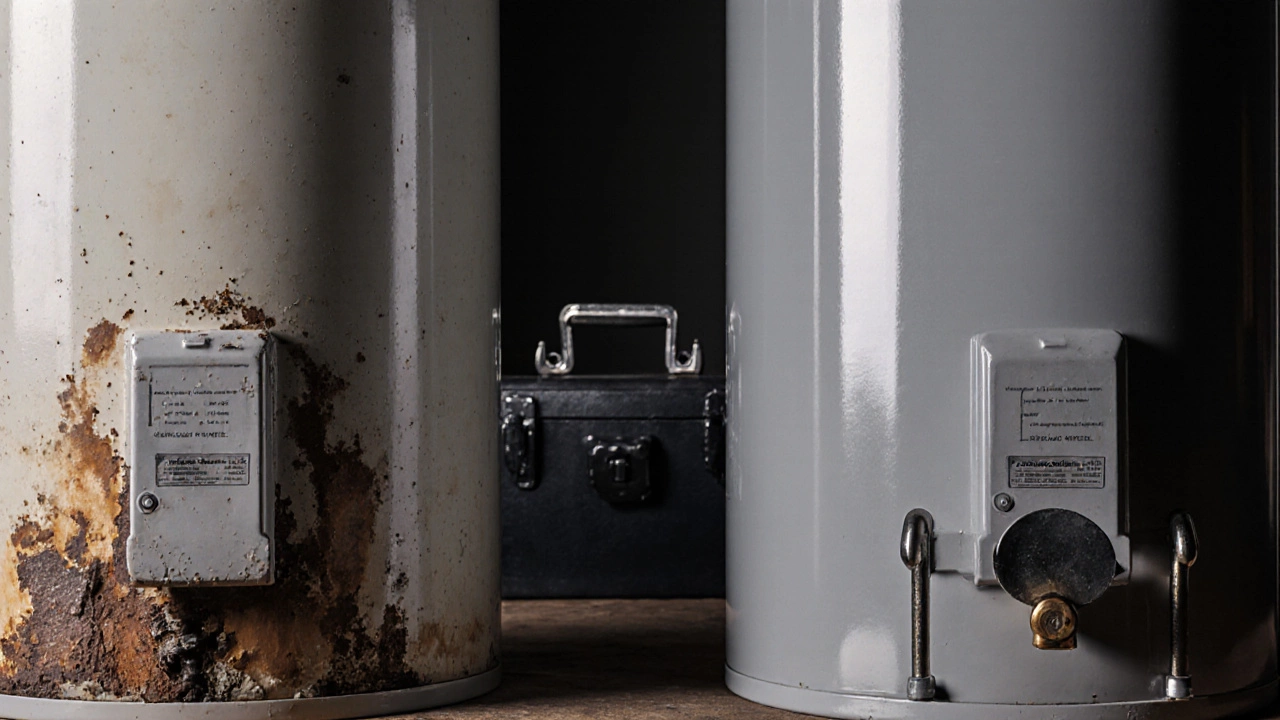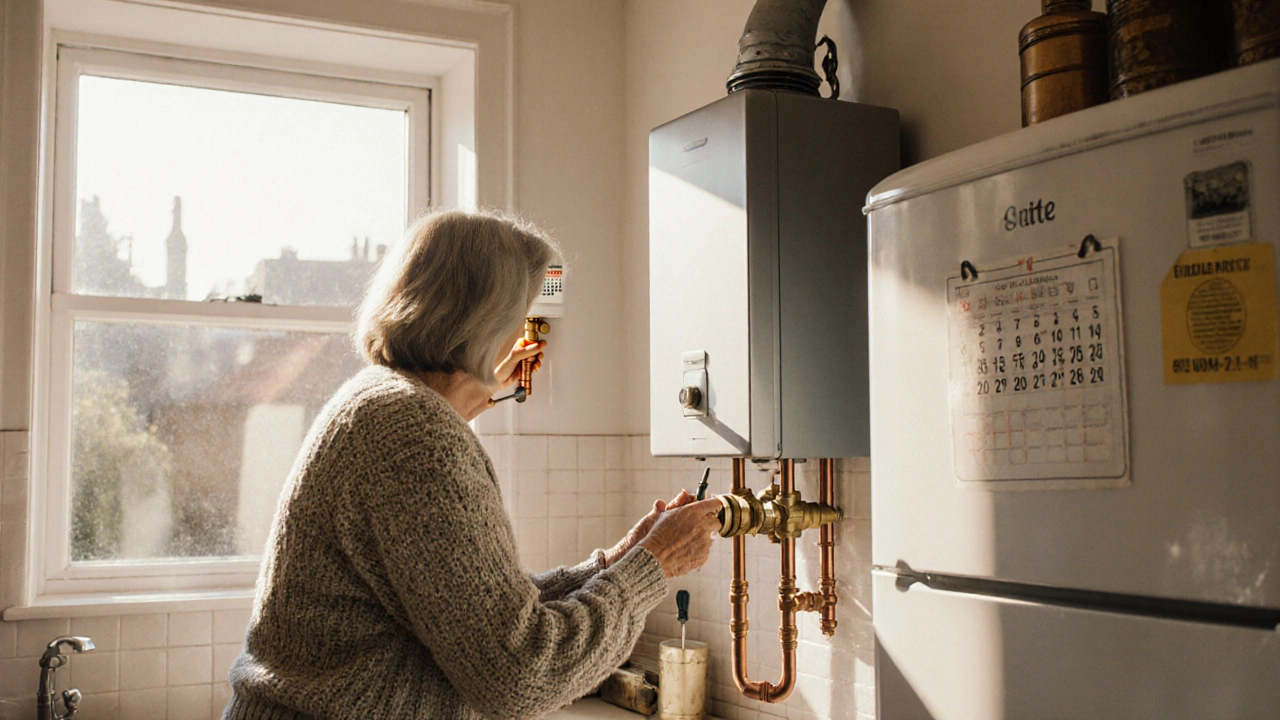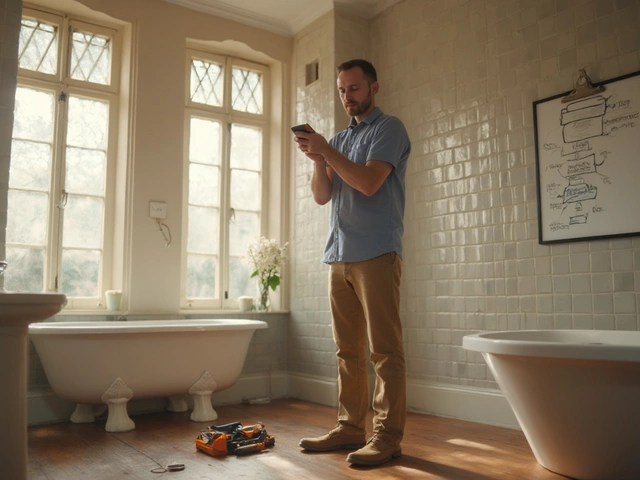Water Heater Lifespan Estimator
This tool estimates how long your water heater might last based on key factors.
Hot water heater is a home appliance that heats and stores water for domestic use, typically powered by electricity or gas. Most homeowners wonder whether a unit can survive three decades without a replacement.
What Determines a Water Heater’s Service Life?
Three big groups drive longevity: tank water heater design, the quality of the water it meets, and how often you give it TLC. A steel-lined tank that sits under a concrete slab will corrode faster than a stainless‑steel model placed in a ventilated crawl space. Hard water, which carries high levels of calcium and magnesium, accelerates corrosion inside the tank, especially if the anode rod is depleted.
Temperature settings also matter. The built‑in thermostat regulates how hot the water gets; set it too high and you boost mineral buildup, set it too low and you risk bacterial growth. Finally, the energy factor (EF) indicates efficiency - higher EF units tend to run cooler longer, which can lessen wear.
Typical Lifespan: Tank vs. Tankless
Historically, tank water heaters have been credited with a 10‑15year life span. Some premium models, especially those with a high‑quality glass‑lined interior and a sacrificial anode made of magnesium, push toward the 20‑year mark. tankless water heater (also called on‑demand heaters) lack a storage tank, so there’s no interior that can rust out. Their heat exchangers, often made from copper or stainless steel, can last 20‑30years if the water is soft and the unit is serviced regularly.
In Australia, a 30‑year claim is rare but not impossible for a tankless system combined with a robust warranty and diligent maintenance. For a conventional tank unit, hitting 30years usually means you’ve installed a high‑grade stainless‑steel tank, use a water softener, and replace the anode rod every 3-5years.
| Attribute | Tank Water Heater | Tankless Water Heater |
|---|---|---|
| Typical Lifespan | 10‑20years (average) | 20‑30years |
| Initial Cost (AUD) | $800‑$1,500 | $2,000‑$3,500 |
| Installation Complexity | Simple - fits existing vent | Higher - may need gas line upgrade |
| Energy Factor (EF) | 0.6‑0.9 | 0.9‑0.99 |
| Maintenance Needs | Flush annually, replace anode rod | Descale annually, check heat exchanger |
How to Extend the Life of Your Heater
Below is a practical checklist that works for both tank and tankless units.
- Flush the system yearly. Connect a garden hose to the drain valve, open the valve, and let water run until it’s clear. This removes sediment that can scar the interior.
- Inspect and replace the anode rod every 3‑5years. If it looks heavily corroded, swap it out; a fresh rod can add another decade.
- Check the thermostat setting. Aim for 120°F (49°C) - enough for comfort, low enough to curb mineral build‑up.
- Test the pressure relief valve by lifting the lever; you should hear a quick gush of water. A stuck valve can cause tank rupture.
- If you have hard water, install a water softener or at least a magnetic descaler. This slows down scale that otherwise clogs the heating element.
- Schedule a professional inspection every 5years. Technicians can run a dielectric test on the heating element and verify that the flue (for gas units) is clear.
These steps are simple, cost under $100 in total, and dramatically shrink the odds of a premature failure.

When It’s Time to Say Goodbye
Even the best‑maintained heater shows signs when it’s near the end of its life. Look for these red flags:
- Leaking from the bottom - indicates tank corrosion.
- Rusty or cloudy water - a sign the anode is gone.
- Strange noises (popping, rumbling) - typical of scale‑induced overheating. \n
- Repeated trips of the circuit breaker or blown fuses.
- Age beyond the manufacturer’s warranty (often 10‑12years for tank, 15‑20years for tankless).
When any of these appear, weigh repair costs against replacement. If you’re already pushing 20years on a tank unit, a replacement will likely save you more than a $300 repair.
Cost‑Benefit of Going for a 30‑Year Unit
Imagine you buy a high‑grade stainless‑steel tank for $2,400, get a 20‑year extended warranty, and keep up with yearly flushing. Over 30years, the total outlay might be $2,900 (including $500 in maintenance). Compare that with a mid‑range tank bought for $1,200 that needs replacement at year 12 and again at year 24 - total cost could exceed $3,500, plus the inconvenience of downtime.
The math shows a 30‑year strategy can make sense if you have:
- Access to soft water (or a softening system).
- Commitment to routine maintenance.
- Willingness to pay higher upfront cost for long‑term savings.
Otherwise, a reliable tankless unit with a 20‑year life often delivers a better return on investment.
Related Topics You Might Explore Next
If you’re curious about the broader ecosystem, consider reading about:
- Energy‑saving thermostats for water heating systems.
- How heat pump water heaters compare in efficiency.
- Choosing the right water softener for your home.
- Understanding the energy factor rating and how it affects bills.
- DIY vs. professional water heater installation safety checks.
Frequently Asked Questions
Can a tank water heater really last 30 years?
It’s uncommon but possible if you install a premium stainless‑steel tank, keep the anode rod fresh, and perform annual flushing. Most standard tanks cap out around 15‑20 years.
Do tankless water heaters need any special maintenance?
Yes. Even without a tank, the heat exchanger can accumulate scale. Descaling the unit once a year and checking the water flow sensor keep it running smoothly.
How often should I replace the anode rod?
For most homes, every 3‑5 years is a good rule. In areas with very hard water, inspect it annually and replace as soon as it looks heavily corroded.
What are the signs that a water heater is failing?
Leaking from the bottom, rusty water, strange popping noises, frequent breaker trips, and a noticeable drop in hot‑water output are all warning signs.
Is it worth paying more for a high‑efficiency heater?
If you have a large household or run water heating for long hours, the lower operating cost of a high‑EF model can offset the higher upfront price within 5‑7 years.
Can I install a tankless heater myself?
DIY is possible for electric tankless units, but gas‑fired models usually require a licensed plumber to handle venting and gas line work safely.
How does water hardness affect heater lifespan?
Hard water leaves mineral deposits on heating elements and inside the tank, speeding up corrosion and reducing efficiency. A softener can add 5‑10 years to a tank’s life.







